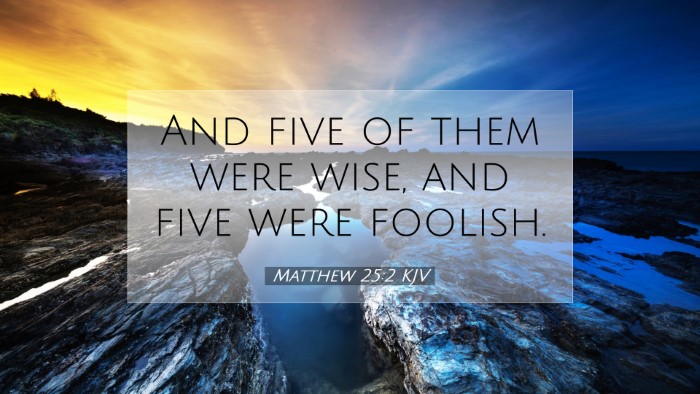Commentary on Matthew 25:2
In Matthew 25:2, Jesus presents the parable of the ten virgins, which serves as a poignant illustration of preparedness and the nature of the Kingdom of Heaven. This verse states, "Now five of them were wise, and five were foolish." Through the interpretation of various public domain commentaries, we can gain a richer understanding of the significance, implications, and theological insights of this verse.
Context and Background
The Parable of the Ten Virgins is situated within a larger discourse on the end times, found in Matthew 24-25. Jesus teaches about His second coming and the need for vigilance among His followers. This parable specifically contrasts two groups of virgins who await the bridegroom's arrival, a metaphor for Christ's return.
Insights from Matthew Henry
Matthew Henry emphasizes the importance of being prepared for the coming of the Lord. He notes that the distinction between the wise and foolish virgins lies in their foresight and readiness.
- Wisdom vs. Foolishness: Henry asserts that wisdom in this context refers to the proactive nature of the wise virgins who brought extra oil for their lamps, symbolizing spiritual readiness and vigilance.
- The Oil as a Metaphor: The oil represents the grace of God, the Holy Spirit, and preparation through good works. Wise believers gather spiritual resources, while the foolish lack this foresight.
- Delay of the Bridegroom: The fact that the bridegroom delayed his coming serves as a reminder to believers that they must remain steadfast and not grow weary in their waiting.
Insights from Albert Barnes
Albert Barnes offers a more practical interpretation, focusing on the application of this parable in the lives of believers.
- Practical Preparedness: Barnes highlights that just as the virgins prepared for the bridegroom, Christians must prepare for Christ's return through prayer, study, and living a life that reflects His teachings.
- Two Distinct Groups: The categorization into wise and foolish serves not just as a warning, but as an exhortation—encouraging believers to assess their own readiness and spiritual state.
- Consequences of Unpreparedness: Barnes notes the dire consequences faced by the foolish virgins as a reflection of the spiritual realities that await those who neglect their faith.
Insights from Adam Clarke
Adam Clarke approaches the verse with a theological perspective, intertwining the cultural context of Jewish weddings with deeper implications for spiritual vigilance.
- Cultural Significance of Weddings: Clarke elucidates the customs related to Jewish weddings, where the bridegroom would come at an unknown hour. This unpredictability emphasizes the need for constant readiness in the life of a believer.
- Spiritual Applications: He suggests that the foolish virgins symbolize those who are nominal believers, lacking genuine faith and the invigorating presence of the Holy Spirit.
- The Role of the Church: Clarke emphasizes the role of the Church in guiding its members toward being the 'wise' virgins through teaching and encouraging preparedness for Christ's return.
Theological Implications
This verse serves as a microcosm of Christian eschatology, with broader implications concerning the nature of faith, grace, and readiness.
- Preparedness in Faith: The distinction between wise and foolish represents the two types of believers: those who actively cultivate their relationship with God, and those who are complacent in their faith.
- The Importance of Community: The parable showcases the communal aspect of waiting for Christ. While individual preparation is necessary, it also underscores the importance of fellowship and shared faith journeys.
- Hope and Vigilance: The waiting period is not just a test but also an opportunity—a hopeful reminder that in preparation, believers actively participate in God’s unfolding plan.
Conclusion
Matthew 25:2 serves as a profound reminder that Christian life is marked by vigilance and the necessity of being spiritually prepared for Christ's return. Through the insights of Matthew Henry, Albert Barnes, and Adam Clarke, we glean essential lessons on the importance of wisdom and foolishness in our spiritual journey. As we reflect on this parable, may we all strive to be numbered among the wise, filled with the oil of faith and readiness as we await the glorious return of our Bridegroom.


